基于单片机控制的数控开关电源设计(附程序,PCB图,电路原理图)
无需注册登录,支付后按照提示操作即可获取该资料.
基于单片机控制的数控开关电源设计(附程序,PCB图,电路原理图)(开题报告,外文翻译,论文20000字)
摘 要
本文介绍了一种基于单片机控制的数控开关电源,以89C51单片机作为控制核心,对开关变换电路进行脉宽调制,构成一个智能闭环控制系统。单片机控制的开关电源具备更加完善的功能,更人性化、智能化,便于实时监控。其功能主要包括对开关电源输出电压进行检测,并显示实时电压值;通过按键进行编程预置期望输出的电压;通过A/D转换器采样输出电压,根据PID算法计算控制量修改占空比,以得到期望的输出电压,并通过PID算法控制输出电压稳定在设定的电压值上;拥有可靠的过流保护功能以及辅助电源可同时作为电源输入和给单片机提供工作电压,并可以通过键盘不断改变PID参数,可以进行实时调整。本系统具有友好的用户界面,结构简单,成本低廉,实用性强,扩展空间大,可作为实验室电源,在计算机,家电产品等许多方面也有非常好的应用前景。
开关电源因其具有功耗低、效率高的优点,在家用电器、科学实验、教学设备等等领域得到了广泛的应用。随着电子技术的高速发展,各种电子设备对电源的要求越来越高,电源也朝着高效率、高可靠性以及智能化的方向发展。传统开关电源使用专门的脉宽调制芯片,结构复杂,而利用单片机和键盘可以简化电源结构,实现对电源的智能控制,本文正是从这个角度考虑,研究制作低成本、操作简单、智能控制的开关电源。
关键词:开关电源;单片机;脉宽调制;功率开关管;占空比
Abstract
This text introduces one kind of digital control switching mode power supply ,which controlled by single chip microcomputer 89C51 ,using pulse width modulation to control switch transformation circuit , constitute a close loop intelligence control system. The switch power supply, which is controlled by single chip microcomputer, has more perfect function, more humanized ,intelligence and easier for the hour supervise and control. Its function mainly includes the examination of the output voltage ,and the manifestation of voltage value ; input the expect output voltage through the keyboard ;take a sample from the output ,basing on the compute result of the PID procedure to modification the duty cycle to get the expect voltage and control the stability of out put voltage ; having a dependable over-current protection function and a assistance power supply ,which can provide power to the single chip microcomputer ,and change the parameter of PID to improve the control result .This system has a friendly customer interface ,very simple structure ,very low cost ,very strong function ,a big space to expand ,can use as the laboratory power supply , at the power supply of the computer and the appliance product ,also has very nice applied foreground.
Switch power supply because its power exhaust is very low and its efficiency is very high, so it got extensive application at home appliances, science experiment, the teaching equipments etc. realm. With the quick development of technical electronics, the request of various electronics equipments to power supply became more higher . Power supply also develop toward the direction, which become high-efficiency, more credibility, and more intelligence. The traditional switch power supply uses the specialized PWM chip to control, structure complications. And making use of the single chip microcomputer can carry out the intelligence control to the power supply and simplify the power supply structure. This text considers from this angle exactly, inquiry into making a switch power supply, which is Low cost, easier to operate and intelligence control.
Key words :switching mode power supply ;single chip microcomputer ;Pulse Width Modulation control;duty cycle
课题基本要求
(1)设计、制作精密数控直流电源;
(2)使用单片机构成控制系统,通过键盘预置输入电压,可显示预置电压和输出电压;
(3)掌握A/D及D/A转换及芯片使用方法;
(4)掌握数控电源的设计方法;
(5)掌握单片机软件编程方法;
(6)掌握传感器的基本原理和模拟电子电路基本原理等。
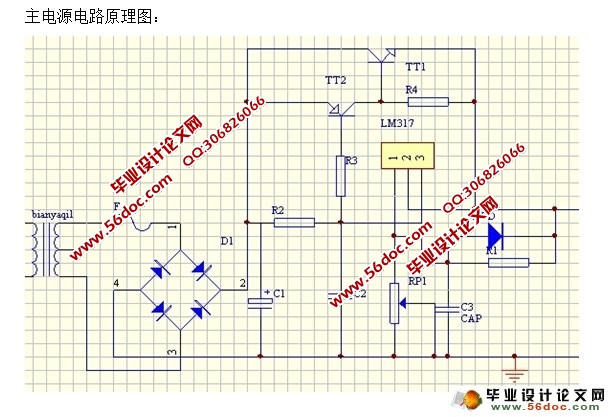
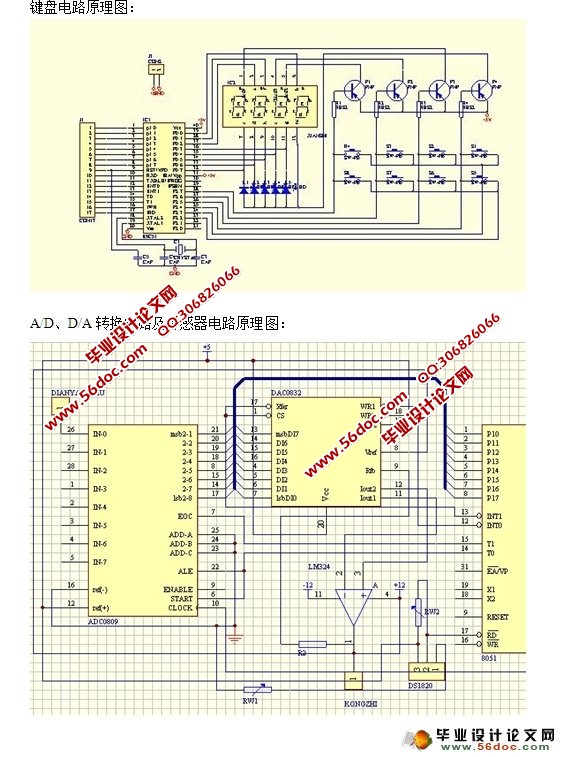
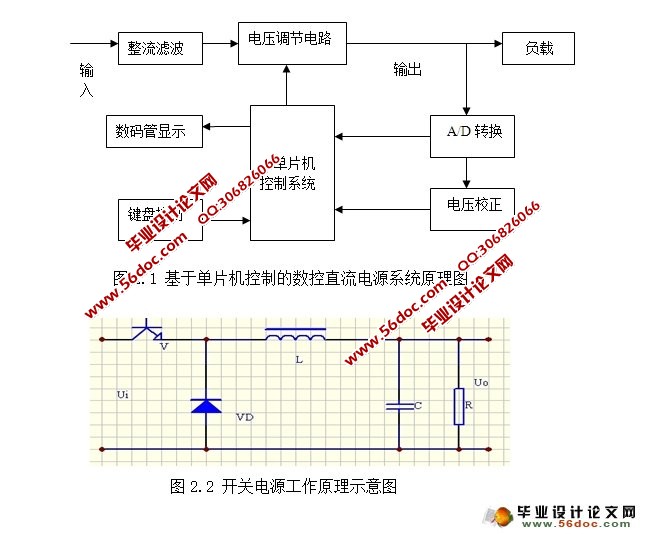
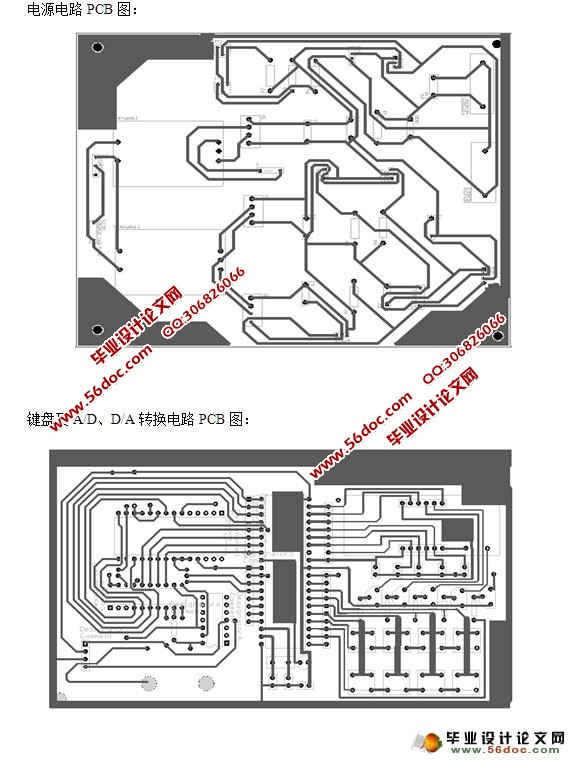
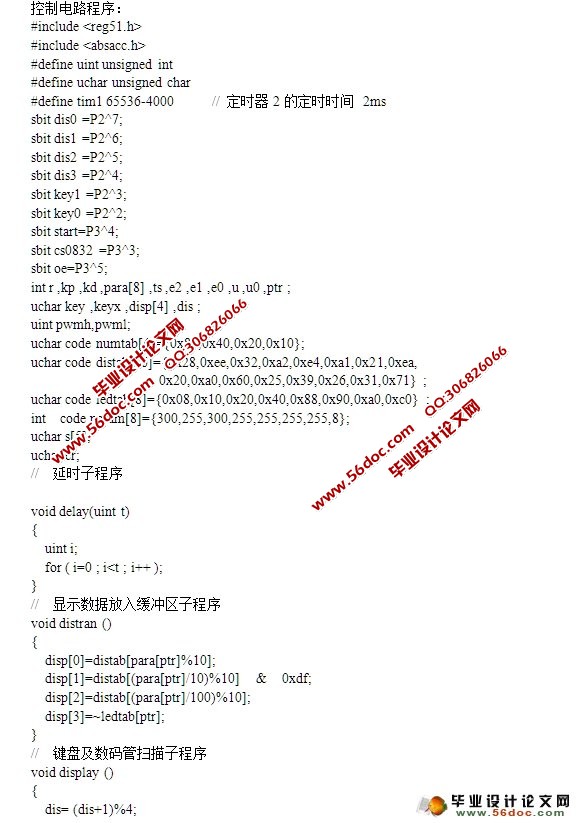
目 录
引言 1
1 概述 1
1.1 课题来源及意义 1
1.2 课题基本要求 2
1.3 相关背景介绍 2
2 基于单片机的数控直流电源方案设计 2
2.1 方案设计 3
2.1.1 方案1:开关稳压电源 3
2.1.2 方案2:线性稳压电源 4
2.2 方案论证 5
2.2.1方案一分析 5
2.2.2方案二分析 5
3.硬件电路设计 5
3.1 主电源电路设计 6
3.1.1 变压器的选择 6
3.1.2 整流滤波电路 7
3.1.3 稳压调压电路 8
3.1.4 扩流电路 8
3.2 副电源电路设计 9
3.3 控制部分电路设计 10
3.3.1 A/D及D/A转换电路 11
3.3.2 校正部分电路 14
3.3.3 键盘及数码管显示电路 15
4 软件设计 17
4.1 软件介绍 17
4.1.1 Protel 99 SE 18
4.1.2 Keil uVision2 18
4.2 编程思想 19
4.2.1 键盘和数码管扫描子程序 19
4.2.2 ADC0809转换子程序 20
4.2.3 DAC0832转换子程序 21
4.2.4中断定时处理程序设计 21
4.2.5数码显示子程序 22
4.2.6 温度传感器的电压校正 22
5 系统调试 22
5.1 硬件模块调试 22
5.1.1 电源部分技术指标测试 22
5.1.2电源输出电压、电流范围测试 24
5.1.3 硬件模块调试小结 25
5.2 软件模块调试 25
5.2.1 键盘按键控制及数码管显示 25
5.2.3 数字温度传感器DS1820的电压校正 28
5.2.4 软件模块调试小结 28
6. 技术指标及使用方法 29
7 结论 29
谢辞 30
参考文献 31
附录 31
